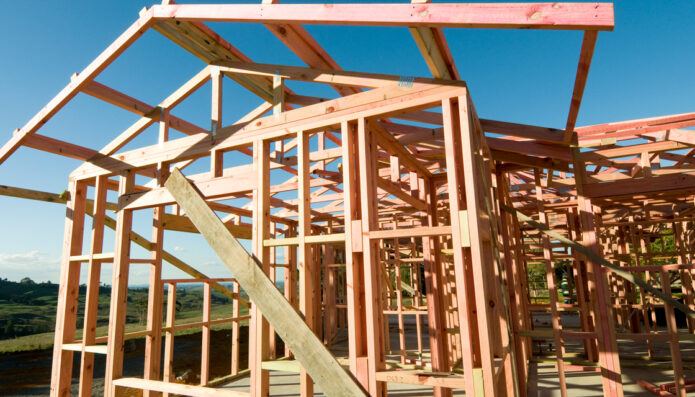PHOTO: Image by rawpixel.com
The global real estate industry is valued at trillions of dollars, involving a diverse range of participants from individual homeowners to multinational real estate firms.
It’s a mature and ever-growing market; as the population increases, there’ll be more demand for real estate on a global scale, with a concentration towards metropolitan cities and suburban areas close to these cityscapes.
Given its role in providing spaces for living and business, real estate is naturally among the more financially driven industries in any economy.
While most people take out home loans and cash to cover the purchase price of these properties, blockchain and cryptocurrency are new financial gateways that may very well upend the way people transact high-ticket assets like houses and office buildings.
Blockchain, for the unfamiliar, is a digital ledger that keeps a record of transactions across several computers. It’s a secure, transparent, and unchangeable ledger that’s the backbone of cryptocurrencies and many other technological applications.
From tokenisation to smart contracts, blockchain has changed the way many people approach the real estate industry. Let’s look at six popular and drastic ways that this new type of technology is disrupting this space.
-
Real Estate Properties Can Be Tokenised
Thanks to the unchangeable and individualised nature of the blockchain, real estate can be tokenised—or in simpler terms, converted into an owned, digital asset that can be held, sold, or traded.
The addition of real estate properties to the blockchain enables real estate transactions to be made through this immutable platform, elevating the opportunities for investors to invest in property through their preferred methods.
Real estate tokens not only enable easy real estate transactions, but they also make it easier and more accessible for people interested in real estate to invest in the field, even if they don’t have enough money to purchase a downpayment or apply for a property loan for the real thing.
For one, tokenised real estate enables fractional ownership. This means that investors can ride the tide of property appreciation with just a minor investment—similar to stocks. Fractional ownership also helps investors avoid maintenance and leasing fees since they don’t need to manage the property outright.
-
Investors Can Buy and Sell Real Estate in Crypto Marketplaces
Across all marketplaces online, real estate listings have an associated price attached to the property. It’s typically assumed that the price is to be paid through cash loan, or credit—and the question of whether these sellers would accept crypto payments or not is a shot in the dark.
But with the increase in the Bitcoin price over the months and the generally positive reception towards cryptocurrency following the 2024 halving, more people are considering cryptocurrency as a viable addition to their investment portfolio. And this mainstream adoption of cryptocurrency has made crypto-specific industries feasible grounds for crypto holders to transact in.
One real-estate adjacent development is the proliferation of various crypto marketplaces for buying and selling houses and offices.
These websites host platforms that are built for two parties to trade assets. Specifically, these platforms facilitate the trading of a token of a full property or share of a property with crypto, which can then be exchanged for fiat currency or held onto as an investment.
This revolutionary way of buying real estate has seen a positive reception since it can be reflected immediately. It’s like purchasing a stock in that regard, skipping all the bureaucracies attached to traditional real estate purchasing.
-
It Introduces Smart Contracts
Another great aspect of making transactions with blockchain is that it enables smart contract agreements.
A smart contract, for the uninitiated, is a self-executing contract that automates an action (or series of actions) based on the terms that have been pre-arranged by a buyer and seller.
Smart contracts have various applications outside the real estate sector, such as how vending machines dispense a chosen food item based on retrieval of the payment and the push of a button.
And in the real estate industry, where there are dozens of microtasks involving both the buyer and seller, smart contracts streamline these administrative processes and change time-consuming activities into mere seconds, if not immediately.
Some practical examples of smart contracts in action include automatic verification of payments and regulatory compliance before transferring a property. It can also serve as an escrow holder, releasing funds only when conditions are met.
Smart contracts also help automate processes for property managers. For instance, it can manage payments to utility companies and service providers and help keep track of maintenance requests.
Since smart contracts are also built on a blockchain network, which is a secure and transparent platform not owned by the parties, this makes it a reliable option—granting both parties peace of mind that no fraudulent activities will take place.
-
Blockchain Eliminates Need for Intermediaries
When buying a property the old-fashioned way, there tend to be a lot of miscellaneous fees associated with the purchase. From legal fees to broker fees, these additional expenses can add up to the tens of thousands and cause you to lose more money than you’re willing to afford.
With blockchain entering the picture, the need for these professionals becomes greatly reduced, if not downright eliminated. This is because the blockchain ecosystem is secure, safe, and transparent—which heavily restricts the possibility of scam artists and unscrupulous individuals from successfully taking advantage of the system.
Not only would you end up saving more money by transacting through the blockchain, but you’re also making the process fly by quicker since you’re skipping some steps along the house-buying process. This not only makes local property purchases easier, but it also makes buying property cross-country (and even internationally) a much simpler ordeal.
-
Blockchain Lowers Real Estate Costs
Opting to pay through a decentralised blockchain network helps lower real estate costs. A lot of costs in the traditional homebuying process—such as registration fees, loan fees, taxes, and inspection costs—tend to incur an associated cost.
By using the blockchain, you can lose these costs and keep the final price low. And with inflation hitting the real estate market particularly hard in major cities across Australia and New Zealand, every little bit of savings will surely help.
-
Blockchain Improves Liquidity
Another standout feature of blockchain technology is its ability to make what was once a highly illiquid item into something more liquid.
Historically, real estate is a non-liquid item since it can take months for an individual or company to secure the right buyer.
However, with blockchain technology, real estate properties can be fractionally owned and tokenised. This means that people can own a share of a property without having to actually pay a downpayment for the house.
Since real estate is tokenised, it can be easier to trade and sell to other people. Furthermore, since these transactions are done through the blockchain, there’s less bureaucratic red tape restricting two parties from pushing through with the transaction.
Furthermore, when an item is perceived to be more liquid, this can attract a new market of investors. This, in turn, can spike up demand and property values, further bolstering the property price of a community, and the industry at large.














